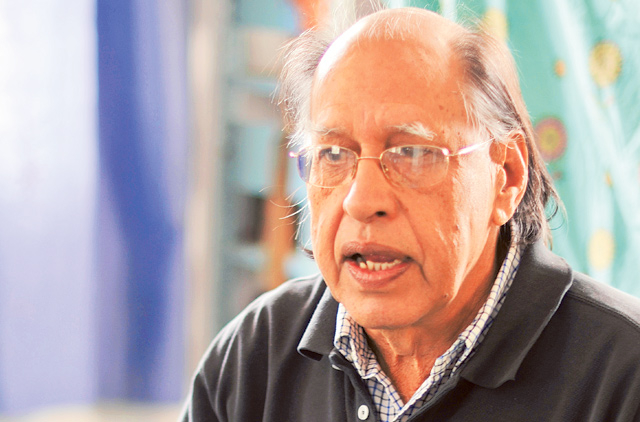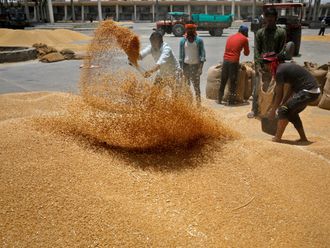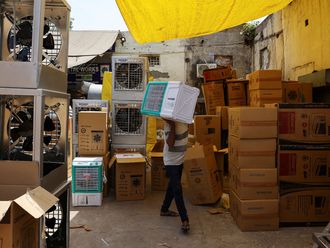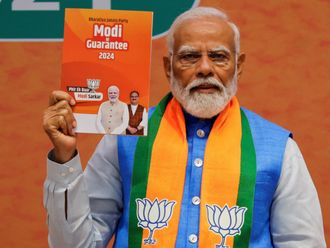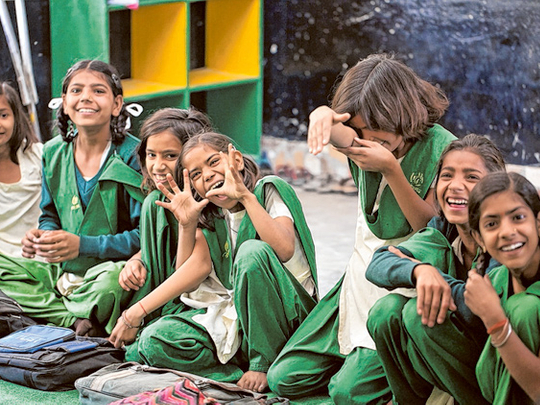
Entrepreneurship is one of the most egalitarian and non-discriminatory traits. It transcends literacy, age, gender, caste and religion. It only takes an entrepreneur to transform grains of wheat into a loaf of bread; the value addition is about five times. Transform a block of raw iron to steel; the value addition is about 10 times.
Imagine the value addition potential of transforming young girls into articulate assertive women by imparting good education and offered better opportunities; the value addition will be infinite.
This is the challenge that Virendra (Sam) Singh, 73, a retired Dupont South Asia head, decided to take on when he relocated to his ancestral village of Bichaula in Anupshahr block of the northern Indian state of Uttar Pradesh, after having spent 37 years in America.
The village, with an abysmal 55.57 per cent female literacy rate and an appalling child sex ratio at 821 girls per 1000 boys, offered Singh the perfect laboratory to find his answer to a jeer he faced back in the US. Someone had told him, “One billion pairs of hands and what have you done with them.” It kept ringing in his ears.
“Through value-based education, we empower the girls, teach them new skills and help them earn money. We teach girls not to run away, but rather transform the villages they get their identities from. I may have not been able to reinvent a billion pairs of hands, but I have made a beginning,” says Singh, recalling how ashamed he felt on seeing the front page of “The New York Times” carrying a picture of Indian children rummaging for food in a garbage dump.
In 2000, Singh chose to invest 100 acres of his family land and $1 million (Dh3.67 million) from his retirement savings to start the Pardada Pardadi Educational Society (PPES), an all-girls vocational school offering free skill-based training and education. “Pardada Pardadi” in Hindi means great grandparents. PPES is attempting to undo the deep-rooted, feudal mindset that has restricted many women in India from attending schools and opting for better choices for themselves.
“The hierarchical system trains you in a different kind of leadership that makes a person patriarchal. But when you leave your country, you become more conscious of it,” said Singh, suggesting how girls in India are often seen as liabilities, to be disposed off at marriage and good enough just for domestic chores.
Singh reflects on how conversations about India and its imposing poverty were common in the west. Discussions built around the themes of developing a self-sustaining model for empowering the poor in India were common. One of his colleagues had come to him saying how a model actually existed in India itself, that a person called the Dalai Lama was already doing it.
“He had no idea who the Dalai Lama was, but quipped we knew much more about marketing,” recalled Singh. Singh went to Dharamsala to get a handle on the Dalai Lama’s socio-economic engineering of linking the handicrafts produced by school children to the local markets. He later modified the model to suit PPES.
Besides offering to equip girls with skills like sewing and embroidery, PPES gave villagers an offer they couldn’t refuse. For every school day attended, PPES offered to deposit Rs10 (Dh0.6) in a bank account opened against the girl’s name. This deposit would amount to Rs35,000 by the time she finishes school. Additionally, the girls are given three meals a day, textbooks, school uniforms and, depending on distance from the school, a bicycle.
“No amount of pity or charity can solve the problem. It is a business problem that only business can solve. We impart education, but essentially it’s a roti-driven model,” says Singh whose primary goal is to educate at least one girl from each of the 50,000 families in Anupshahr.
After much persuasion, 45 girls joined PPES, but 26 dropped out after the first year. “The majority of the girls came on the first day, collected their stipend and never came back as their fathers took away their money. Parents simply sold off the textbooks, the uniforms and the bicycle. Absenteeism was also a persistent problem as the girls were helping raise their siblings or doing household work,” says Singh.
This got Singh to rework his business model. Now girls are entitled to money only after they finish school or if they get married at the age of 18 years or above. The school doesn’t enrol married girls, thereby reducing the incidence of child marriages. Girls not wearing proper uniforms and latecomers are sent back home. Those, absent without prior approval or skipping school beyond the annual paid and unpaid holidays, lose Rs20 a day. High attendance and achievements are rewarded.
Reeta Kumari, a student, says, “We never saw electricity or books before coming to PPES. Now, we realise what value education can bring to life. And our parents value us better.”
Over the last year, PPES has built 71 toilets in the homes of its students. Families were asked to pitch in with a token Rs500. The total cost comes to Rs16,500 per toilet. But it comes with a rider that incentivises attendance. Only those enrolled with the school for two years or more and boasting of a good attendance get the toilets. This is significant, considering almost 53 per cent Indians still continue to defecate in the open, according to a 2013 UNICEF report.
When PPES realised that girls hitting puberty missed out on their classes for weeks or they soiled their clothes, it began manufacturing low-cost sanitary napkins. Today, the facility manufactures about 18,000 pads every month and distributes them at a nominal cost.
However, the biggest challenge for PPES was to change the way families saw their daughters. “How will education help my daughter? In the end, she will have to cut grass. She might as well start doing it now,” was the common refrain. Singh realised that while solving one problem, he was creating another. Even though girls were skilled, there weren’t any employment opportunities for them.
“I understood why the society was so resistant to change,” he says. He started setting up women’s self-help groups under the PPES umbrella and hired a marketing head whose job was to find ways to sell quilts, bags and pillow covers that the girls were taught to stitch at school. A part of these funds are now used to run the society.
The society has opened a 2,100 square feet boutique in the glitzy MGF Plaza Mall in Gurgaon, as well as sales outlets in Meerut and Bhopal. The items are also available online on its website.
The society has managed to attract funds from SM Sehgal Foundation, India, and the USAID (US Agency for International Development). Axis bank, an Indian bank headquartered in Mumbai, has recently agreed to grant up to Rs1.4 million to the society over a span of three years. Some 50 individuals, ranging from a UK-based entrepreneur to a Mumbai-based public relations executive, are sponsoring the annual education of 71 girls at Rs17,000 per year.
The society is also training girls for employment in the business process outsourcing (BPO) sector and has set up a call centre with the Gurgaon-based Broadway Theatre clone Kingdom of Dreams as one of its first clients. Singh is now looking for companies to hire the girls.
“It is because of PPES that I look forward to life. I lost my father many years back and my mother is paralysed. We are five siblings trying to make a living. I want to work in the BPO sector and use the earnings to start a small business in my village,” said Geeta who has completed her class XII from PPES and is now undergoing BPO training.
It is worth noting in this context that not only is the rural Female Labour Force Participation (FLFP) in India as low as 25 per cent of the overall FLFP of 23 per cent, but despite their importance to agricultural production, rural women have little security in terms of ownership, inheritance, settlement programmes and production credit.
Singh knows he has a still bigger challenge ahead of him – to ensure that PPES continues to perform and transform even in his absence.
His hopes lie with Renuka, the chief operating officer, and his two daughters Renu and Ena who are presently in the US. Singh is hopeful his daughters will take over the mantle. After all, he too was the pampered son of a wealthy feudal clan who could have lived luxuriantly off his retirement money abroad while lamenting on the sorry state of affairs in India every once in a while.
“If there is a system in place, ordinary people can achieve extraordinary things. I have just put a system in place. Hope all the other things will now fall in line,” says Singh.
After 13 years, PPES is a large, plain building with several class-rooms, workshops, offices, a computer lab and apartments for teachers, all built around a large courtyard where the children also eat their daily meals. The school campus is dotted with inspirational messages.
Corridors have large framed posters of women achievers like painter Amrita Shergill, former Indian President Pratibha Patil and former Indian Police Service officer Kiran Bedi. Classrooms are named after women like Helen Keller and astronaut Kalpana Chawla among others.
“We had all kinds of problems getting 45 girls to attend the school. After 13 years, I have 1,267 girls,” said Singh. That is 1,267 lives changed.
Archisman Dinda is a writer based in Kolkata.


